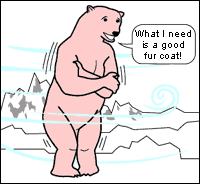I have so much to do, readers, with work up to my eyeballs. I need to stay on task and to keep focused! And I was attempting to do just that when an e-mail popped into my inbox with the subject “Worst example of evolution misconception.” It was sent by Ralph Bouquet, with whom I worked on the NOVA evolution lab and blogs about evolution misconceptions, so I figured I shouldn’t ignore it. I opened it. And in it was a link—a link to a virtual nightmare.
The offending party is the UK newspaper the Telegraph, which is way more credible than my last target of ire from those parts, the Daily Mail. My in-laws get the Telegraph, for goodness’ sake! And the piece was written by a science editor. So how bad could it be?
Well, the headline suggested that it could be pretty bad indeed: “Humans could evolve webbed feet if sea levels rise, scientist claims.” I mentally buckled myself in, and read on:
“Rising sea levels could force communities to live underwater or semi-aquatic towns which could change out [sic] physiology.
Dr. Matthew Skinner, a paleoanthropologist from the University of Kent, claims that humans could evolve to have webbed hands and feet and less body hair so they could move quickly through the water.”
This is not good. But it got worse. Here are actual quotes from Dr. Skinner:
"Regular underwater foraging would lead to the evolution of longer fingers and toes which would then likely develop ‘webbed’ interconnecting skin to enable easier swimming…"
"We may evolve a tapetum lucidum, an additional layer in the retina, like cat’s eyes, that would improve our vision in low light conditions such as underwater."
"Due to the cold environment of being submerged in water regularly, we would maintain a layer of ‘baby fat’ into adulthood as an insulator."
Skinner also suggested that our lungs would shrink as we became used to “using artificial tanks to breathe underwater.”
 The piece goes on to include Skinner’s predictions about how we might evolve if we were to emigrate to another planet. Apparently in that case, we would lose our teeth and evolve smaller jaws since we’d be meeting nutritional requirements via supplements that could be consumed through a straw.
The piece goes on to include Skinner’s predictions about how we might evolve if we were to emigrate to another planet. Apparently in that case, we would lose our teeth and evolve smaller jaws since we’d be meeting nutritional requirements via supplements that could be consumed through a straw.
Finally, were an asteroid to hit Earth and plunge us into an ice age, we would, apparently, evolve paler skin and hair to improve vitamin D absorption, larger noses to enable us to warm the air we breathe more effectively, and more hair all over to insulate us against the cold.
I was struck completely dumb. Glenn Branch (who notices everything) noticed the last line of the piece and wondered if this was some kind of promotional tie-in. The line—which was under a video embed and therefore easy to miss—reads, “The predictions were made of the release of Extant Season 2 on Syfy tonight.”
A little more digging revealed that the article was based on a promotional video to celebrate the return of that SyFy thriller. Skinner was apparently asked to discuss how the human body might evolve in three different habitats—Earth with severe sea level rise, another planet, and Earth in a new Ice Age.
I managed to find the video, and...it's not good.
Unless off-camera Skinner said: “Guys, to be clear, you will never ever make this video available to reporters who might write something about it that makes it sound like I’m serious, right?” I feel safe in saying that making the video was a bad idea. Because reporters—lots of them—did pick up the story—and at least in the Telegraph, they did so while burying the lede that this was all in the name of promoting a science fiction show.
And here is where most of the blame should go: to the “science editor” reporting the story. This is a bad piece of science writing. The only way to write about Skinner’s ill-advised predictions would be to point out how unfortunate it is that the scientist clearly forgot that a hallmark of good science fiction is realistic science! As a paleoanthropologist, and member of the Homo naledi team, Skinner surely knows how evolution works—but he seems to have abandoned any sense of it when he made this video for SyFy.
What Skinner should have made clear, of course, is that any adaptations that spread throughout the human populations in these new, extreme habitats, would have to exist already among humdrum human populations. Adaptations do not arise on demand. Natural selection, even operating under the most severe selection pressures, does not purposefully act to give organisms what they need to survive. An actual prediction would have gone  something like this: "In a Waterworld-type environment, individuals that happen to be born with webbing between digits might have a survival advantage. But you could also envision that they’d have a disadvantage when it came to the fine motor skills we rely on so heavily—so who knows? Also, there are only four documented cases of complete webbing of a hand in the literature, so it’s pretty unlikely to spread through the population."
something like this: "In a Waterworld-type environment, individuals that happen to be born with webbing between digits might have a survival advantage. But you could also envision that they’d have a disadvantage when it came to the fine motor skills we rely on so heavily—so who knows? Also, there are only four documented cases of complete webbing of a hand in the literature, so it’s pretty unlikely to spread through the population."
Not as much fun, perhaps, but it’s certainly more sciencey!
This is all too much like the much-criticized display in the Smithsonian hall of human evolution, which made it seem as though if the world got warmer, it’d be okay because we’d all just evolve more sweat glands and longer limbs to help dissipate heat.
How many readers of the Telegraph piece came away thinking that if sea levels rise it’d be fine because we’d get webbed hands and feet for swimming? And how many readers came away with the comparably problematic thought that scientists are dopes because they think so?
We already live in a world where way too many people do not accept evolution. Of those that accept it, a huge proportion probably don’t really know how it works. So things are bad enough. Can we please, scientists, science writers, and science editors, not add to the confusion?
Are you a teacher and want to tell us about an amazing free resource? Do you have an idea for a Misconception Monday or other type of post? Have a fossil to share? See some good or bad examples of science communication lately? Drop me an email or shoot me a tweet @keeps3.

